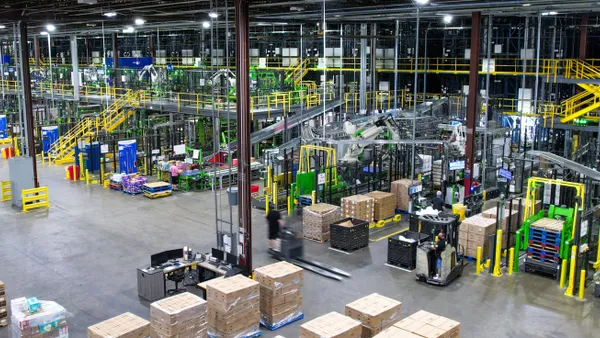Dive Brief:
- In a salary survey report of more than 2,600 supply chain professionals, APICS found 90% of those surveyed received a wage increase in 2017 year over year, with the average salary increase rising 3% over that time period.
- The report also found supply chain professionals tend to be very happy with their jobs, with 96% of respondents rating job satisfaction as 8.4 out of 10.
- Male supply chain professionals' salaries are also 15.8% higher than those of their female counterparts, and respondents whose jobs have the word "operations" in the title receive the highest average salary in the industry, at over $103K per annum.
Dive Insight:
APICS' report suggests supply chain jobs are highly satisfactory, high in demand, but also highly demanding in performance expectation. A few more key takeaways:
- The average overall salary in 2017 was $85,210.
- Professionals involved with "Deliver" and "Return" responsibilities are paid higher than professionals with "Plan," "Source," or "Make" responsibilities.
- Men in the industry make about $90,000 on average, while women make just under $78,000.
- There is a 2:1 ratio of men to women in director, vice president and executive roles.
- About 50% of respondents said their company invested in their professional development.
- When rating the likelihood of staying the field, respondents averaged 8.6 out of 10.
- Certified professionals' salaries were 19% higher than uncertified professionals' salaries.
The report's data paints the supply chain industry as attractive for job opportunities, which could prompt more undergraduates to consider the field, but there's still room for improvement.
Women make 15.8% less than men in comparative roles, and according to HR Dive, that is on the lower end of the gender pay gap scale. A Hired global study recently found women are paid up to 45% less than men in comparative roles.
According to the APICS report, longer tenure usually means a higher salary in supply chain, so promoting more women in director and executive roles could be the first step toward addressing the gender pay gap.
Only half of the respondents said their company invested in their professional development. A 2017 TINYPulse report found professionals' happiness and productivity drop when there's a lack of professional development or recognition in their roles.
While talent retention isn't a top issue for the supply chain industry, talent shortage is, and investing in professional development opportunities might attract more talent to fill the many available supply chain positions and mitigate the talent gap.
Despite the negatives, average job satisfaction is high, which suggests the industry is on the right trajectory. Professionals in the industry indicate their careers are rewarding, but the report didn't specify respondents' reasons why the job satisfaction rating was so high.
Addressing this question of what makes supply chain jobs so rewarding, and then capitalizing on those attributes and the attributes a average young professional is seeking in a job, could lead to stronger numbers in subsequent years.













